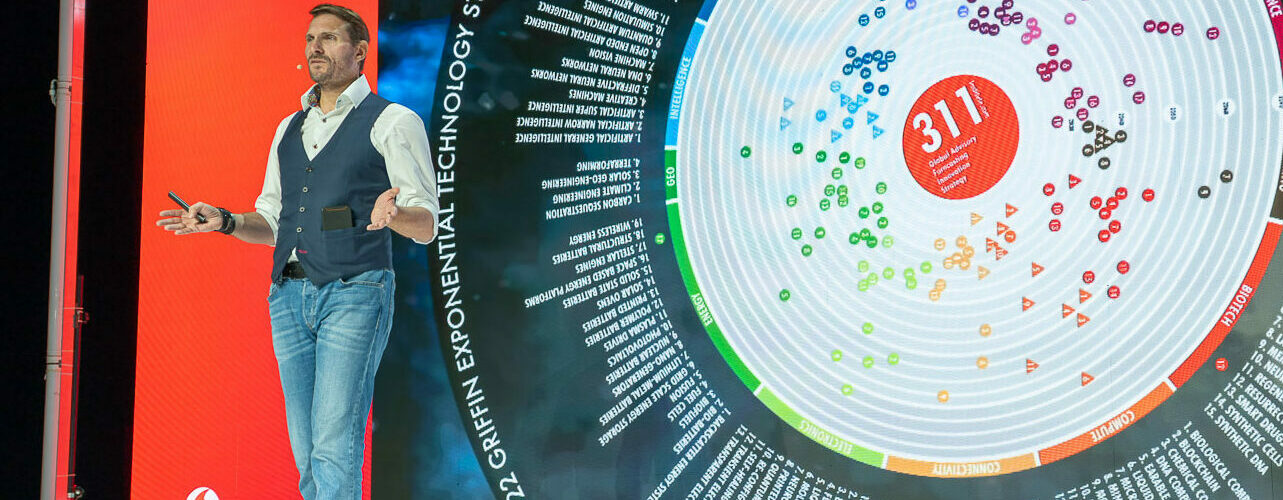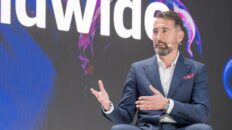CÂȘTIGAȚI LUPTA CU VIITORUL a fost prezentarea care a proiectat audiența IQ DIGITAL Summit Brașov în viitor. Autor: Matthew Griffin, fondator 311 Institute și futurolog.
- Cine e Matthew Griffin? Povestea lui, AICI
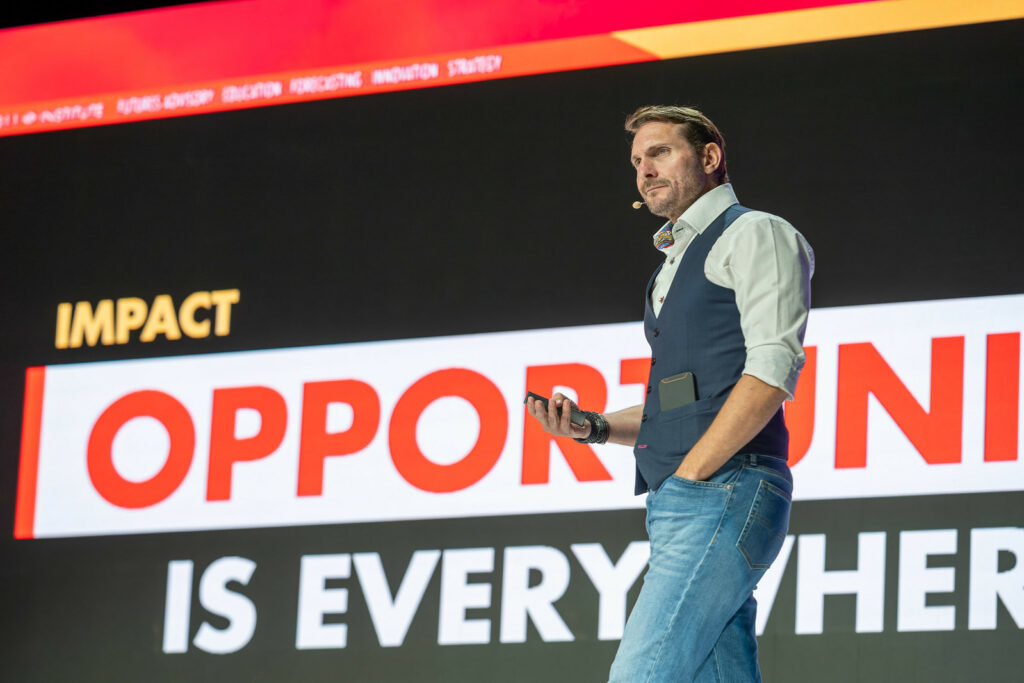
Desi a prezentat mai bine de o oră – audiența a avut o sumedenie de întrebări și, așa cum am promis, acestea i-au fost transmise lui Matthew care a oferit toate răspunsurile.
Le prezentăm așa cum le-am și adresat și le-a redat el, în limba engleză.
IQ DIGITAL e un concept Upgrade 100 dezvoltat alături de George - Inovație BCR. VODAFONE Romania s-a alăturat proiectului în calitate de Partener de Tehnologie.
Iată, așadar…
Interviul Comunității IQ DIGITAL
Matthew proved why all companies of the future will be tech-centric companies, providing services and goods at the intersection between the real, virtual and digital realms, advocating at the same time for the power of the individual to adapt, adjust, address and advance while everything is changing at an unprecedented pace.
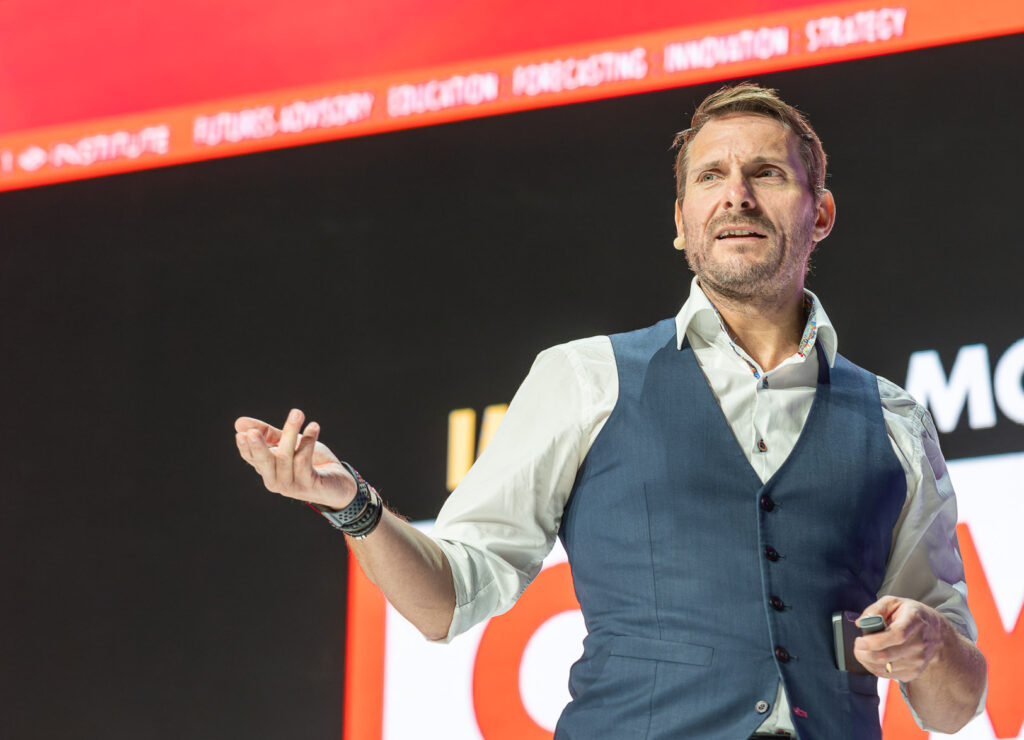
Blockchain and WEB3 will enable the nascence of new companies, run as protocols with decentralized governance and operational capabilities.
IQ DIGITAL: What are your thoughts on blockchain and web 3?
MG: Both are megatrends that will reshape business and society, principally by helping create new digital and virtual economies that sit parallel to today’s physical and digital “traditional and centralized” economies, and by enabling new kinds of companies – from distributed autonomous organizations to organizations that are run as protocols with decentralized governance and operational capabilities.
But because they are megatrends and because their impact is so widespread and disruptive it will take up to 20 years for them to be the “common way we do things” – not even necessarily the status quo.
IQ DIGITAL: How do you see the future of wars?
MG: Future wars will be asymmetric and we’re already seeing the death of platforms such as the aircraft carrier, the naval battle group, the air battle group and so forth as militaries around the world embrace smaller, cheaper, more flexible forms of attack and defense weapons systems such as semi or fully autonomous drone systems (which include small format drones to larger submarines and beyond).
The future of war will also be fast, supercavitating torpedoes that travel at 200knots and above are emerging, as are hypersonic weapons – which ironically only laser weapons and autonomous AI’s can sense and destroy fast enough – and we can already see the development of intelligent hypersonic drone swarms.
So, in short, the future of war, which also includes semi and fully autonomous cyber war, will be very different from today and that’s before we talk about new materials, hybrid weapon systems such as flying missiles that can also submerge, submerging “armory” ships from the likes of China, and much more.
New technologies will help augment and turbo charge human skills and productivity
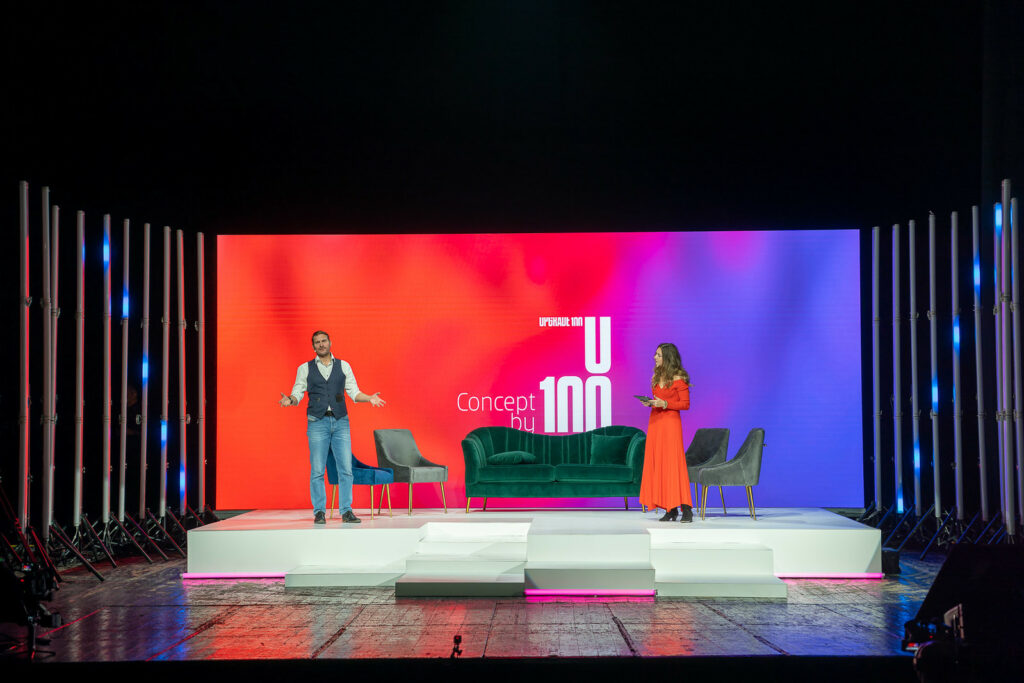
IQ DIGITAL: What will be the next big thing in your opinion?
MG: There are many things but surely the most impactful has to be the future of work where we see new technologies being used in work to help augment and turbo charge human skills and productivity such as immersive technologies, AI, conversational interfaces, and so forth.
Children will, on average, have between 6 and 8 careers
IQ DIGITAL: What should the parents of today steer their kids towards in terms of education and activities that develop abilities for tomorrow?
MG: Children will, on average, have between 6 and 8 careers in their lifetimes according to university experts.
This means they need great soft skills – adaptability, flexibility, resourcefulness, exponential thinking, ethics, creativity, entrepreneurship, storytelling, collaboration with humans and AI, and so forth – but they will also need lifelong learning and education and training systems that give them the hard skills those jobs need and that’s what most L&D strategies today as well as education strategies are failing at.
IQ DIGITAL: Are we slowly becoming immortal?
MG: Yes, but slowly, by 2028 we will pass a point in time that the biotech and healthcare industry call “Escape velocity” where new medical breakthroughs will add more than a year’s worth of life to us (or could) for every year we’ve lived. This includes technologies and trends such as 3D organ printing, in vivo gene editing, personalized medicine and vaccines, predictive healthcare, quantitative self, and many, many more breakthroughs.
“By 2028 (…) new medical breakthroughs will add more than a year’s worth of life to us for every year we’ve lived”.
Matthew Griffin
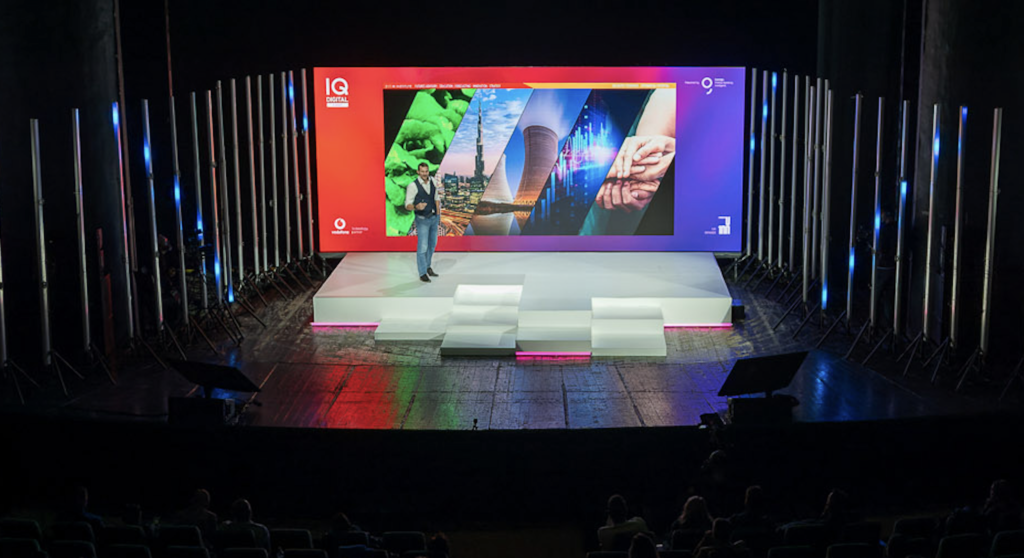
IQ DIGITAL: We’re talking a lot about the future of healthcare and how we are/will be able to prolong our lives and cure diseases such as cancer, or get remote surgery.
How affordable do you believe these services will be and will this draw a thick line between people who will afford this and those who will not?
MG: Initially, big innovations and new technologies cost a lot of money – i.e. sequencing the human genome used to take a decade and a billion dollars, now it’s $1,000 and 5 hours – so technologies, in time, always increase in performance and capability and reduce exponentially in cost, therefore today’s expensive leading edge therapies, such as 100% effective cancer gene therapy treatments are very expensive but in time they’ll be as cheap as a common vaccine.
This takes time though and depending on the technology can take up to 20 years – but it always happens and there are plenty of examples.
A visual story of what happened at IQ Digital Summit Brașov can be seen here.
Here’s one of my keynotes on the future of work and longevity:
“…the most valuable skills to have will be adaptability, exponential thinking, entrepreneurship, creativity, collaboration with humans and machines, resourcefulness, resilience…”
Matthew Griffin
IQ DIGITAL: You mentioned very briefly, our co-existence with AI, automation and robots. As an early Millennial I will be in the workforce for at least 25 more years.
My kids are now teenagers. How could we keep ourselves updated in order to be able to share with our future generations the same jobs market when AI and automation are going to replace so much of our work?
I am a soft-skilled professional. What skills should I acquire to future proof my career?
MG: The rate of change, as we see it today, will only be faster in the future and that means that from a careers perspective we will all need to be able to adapt to new careers and new opportunities. This not only means you will have to learn new hard skills, but from a soft skills perspective the most valuable skills to have will be adaptability, exponential thinking, entrepreneurship, creativity, collaboration with humans and machines, resourcefulness, resilience, and so forth.
“Our main driver will be what it’s always been – purpose. But today what that purpose is is the main question.”
Matthew Griffin
IQ DIGITAL: As humanity is apparently entering its best and most abundant century – it is said that we are going to live longer, healthier, happier and freer, what will be our main driver in the upcoming 10-15 years?
For our psychological well-being, humans have 3 fundamental needs – a sense of autonomy, competence, and relatedness. How are we going to meet these needs in the future economy of automation, universal basic income, and growing loneliness?
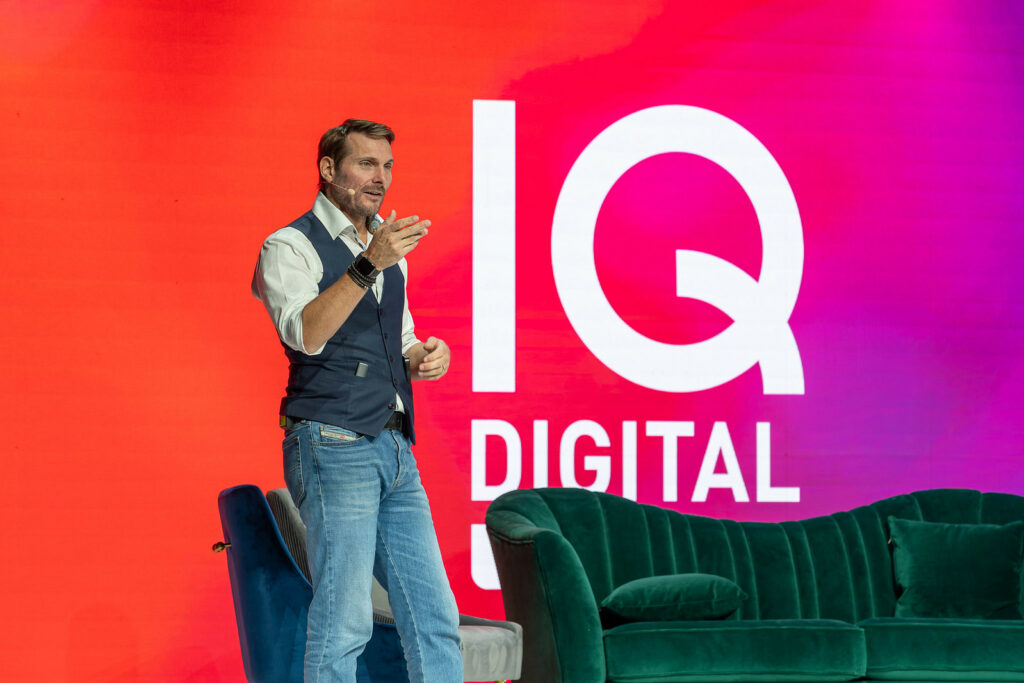
MG: Our main driver will be what it’s always been – purpose. But today what that purpose is is the main question, because with access to more than 4 billion people with little more than a mouse click, with access to investment, expertise, resources, and information, today, we can achieve and accomplish much more than any of our ancestors would have dreamed possible.
When it comes to loneliness now, though we have to work at being connected because, for example, in the past we all used to watch the same TV shows and talk about them, love them or loathe them, but today the family unit all watch shows on different devices in isolation to one another so even this part of our lives poses a risk to us when we talk about togetherness, family units, and loneliness.
And, like it or not, finding and connecting with online tribes is not the same as finding and connecting with offline tribes in our local communities, so communities will become increasingly important to our wellbeing.
“…regulators are generally ten to twenty years behind the curve (…) this means that ensuring that the future is a good future for us all is down to us collectively.”
Matthew Griffin
IQ DIGITAL: How do we make sure that things will work out fine in the future? As individuals, visibility of societal changes is very limited.
Currently the tech landscape is very schizophrenically depicted. There is an acute lack of leadership at global level.
Who puts in motion ethical mechanisms of analysis, reaction, correction or reflection in case things like the influence of social media in elections, mass manipulation, etc. happen on a wider scale? Or WHO SHOULD?
MG: Every technology we have today is a blank slate, meaning it can be used for both good and bad purposes.
Minimizing the futures downsides comes down to being able to predict various futures, understanding their implications, and then regulating them to make sure we get the outcomes we want. However, regulators are generally ten to twenty years behind the curve which means we are often left in the situation where regulation, as we’ve seen in the digital asset and crypto spaces recently, only happens when something goes very badly wrong.
Consequently, this means that ensuring that the future is a good future for us all is down to us collectively, which ironically where many activists spend their time shouting into the wind…
About IQ Digital
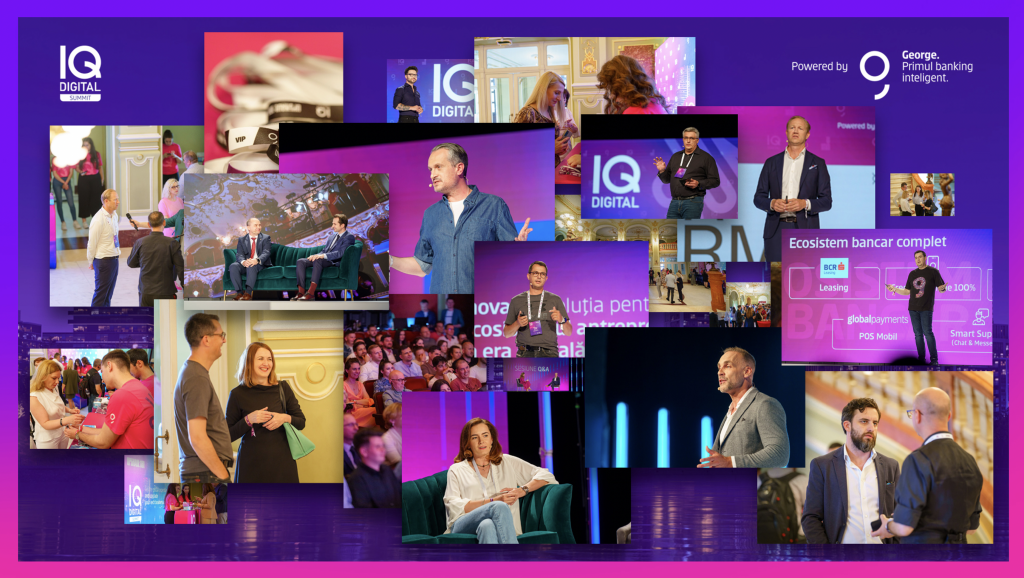
The IQ DIGITAL concept was conceived by the Upgrade 100 team together with George – a BCR innovation – as an informative and educational hybrid media format. Its content combines digital culture with television techniques, aiming to help solving the challenges encountered in the digitization processes faced by entrepreneurs in the Romanian SME sector. Starting with IQ Digital Summit in Brașov, Vodafone Romania joined the project as Tech Partner.
 George. Primul banking inteligent.
George. Primul banking inteligent.
